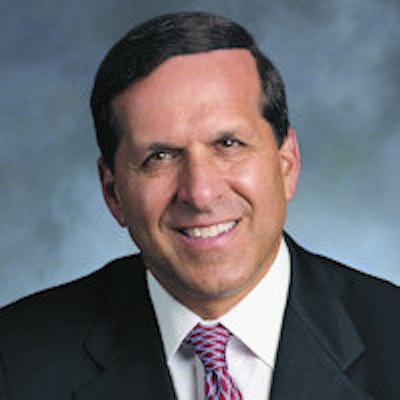
How you approach the process of selling your dental practice can have tremendous impact on your postretirement financial security. Based on our work with numerous dentists, the Levin Group has established seven principles for planning and executing the most rewarding transition possible:
1. Calculate your financial targets for retirement
It's never too early to create a comprehensive plan that projects your personal financial needs for your retirement years and spells out what you need to do -- beginning right now, whatever your age or stage of career -- to reach those goals. This should not be a do-it-yourself project. Call in an expert, such as a dental-knowledgeable financial planner who can evaluate your situation, prospects, and desires, and then identify a target date and price for the sale of your practice.
2. Start building toward your target price five years out
 Roger P. Levin, DDS, chairman and CEO of practice management consulting firm Levin Group.
Roger P. Levin, DDS, chairman and CEO of practice management consulting firm Levin Group.You must work to increase practice value to the point at which you can command the desired price from a new owner. In the new dental economy, 3 out of 4 dentists have seen the value of their practices stagnate or decline. If current production and income levels will fall short of your goal, you'll need time -- allow at least five years -- to implement new growth strategies and reap the rewards. Bear in mind that, in addition, the buyer will want to see an established pattern of improved performance.
3. Track and record financial performance numbers
Assume that, when the time comes, you and your prospective buyer will rely on the judgment of a practice valuation expert to help determine a fair price. This experienced, certified expert will look for hard evidence that the business condition of your practice is what you say it is. You should be able to show such evidence, demonstrating impressive, consistent productivity and profitability for at least three years prior to the sale.
4. Upgrade practice performance with new systems
“This should not be a do-it-yourself project.”
If you haven't reviewed and completely updated your practice's management and marketing systems within the past three to five years, do it now. Be prepared to repeat this process every few years right up to the point of selling your practice. Why? Because systems inevitably develop bottlenecks, becoming less and less efficient, and inefficiency will reduce your practice's value and selling price.
5. Select a sales method
When the time comes to put your practice on the market, think about how you want to approach the selling process. You have three choices:
- Do everything yourself.
- Find a prospective buyer, then let a professional handle the rest.
- Put the entire process into the hands of a professional.
We at Levin Group recommend the third approach because a skilled, experienced expert will always get better results.
6. Use a proven, dental-knowledgeable valuation specialist
It takes a true expert to accurately gauge the value of a dental practice. Make sure the individual you choose has years of experience in the dental field, will follow a certified evaluation process, and can stand behind the valuation in a court of law. Bear in mind that the valuation figure and negotiated sale price are not necessarily the same.
7. Rely on an experienced attorney to represent your interests
Even if you have an attorney to deal with other legal affairs, engage a specialist to sit at the table for the sales transaction. With knowledge of both the business of dentistry and the law, this lawyer will be able to deal effectively with any issues that may arise.
You have a lot at stake in selling your dental practice. By planning ahead and relying on experts, you can ensure a better outcome for this, the final stage of your career as a practice owner.
Roger P. Levin, DDS, is a third-generation general dentist and the founder and CEO of practice management consulting firm Levin Group. Dr. Levin presents more than 100 seminars per year and has authored 68 books and more than 4,000 articles. In 2014, Dr. Levin received the Dental Excellence Award for Best Practice Management Consultant from DrBicuspid.com.
The comments and observations expressed herein do not necessarily reflect the opinions of DrBicuspid.com, nor should they be construed as an endorsement or admonishment of any particular idea, vendor, or organization.



















